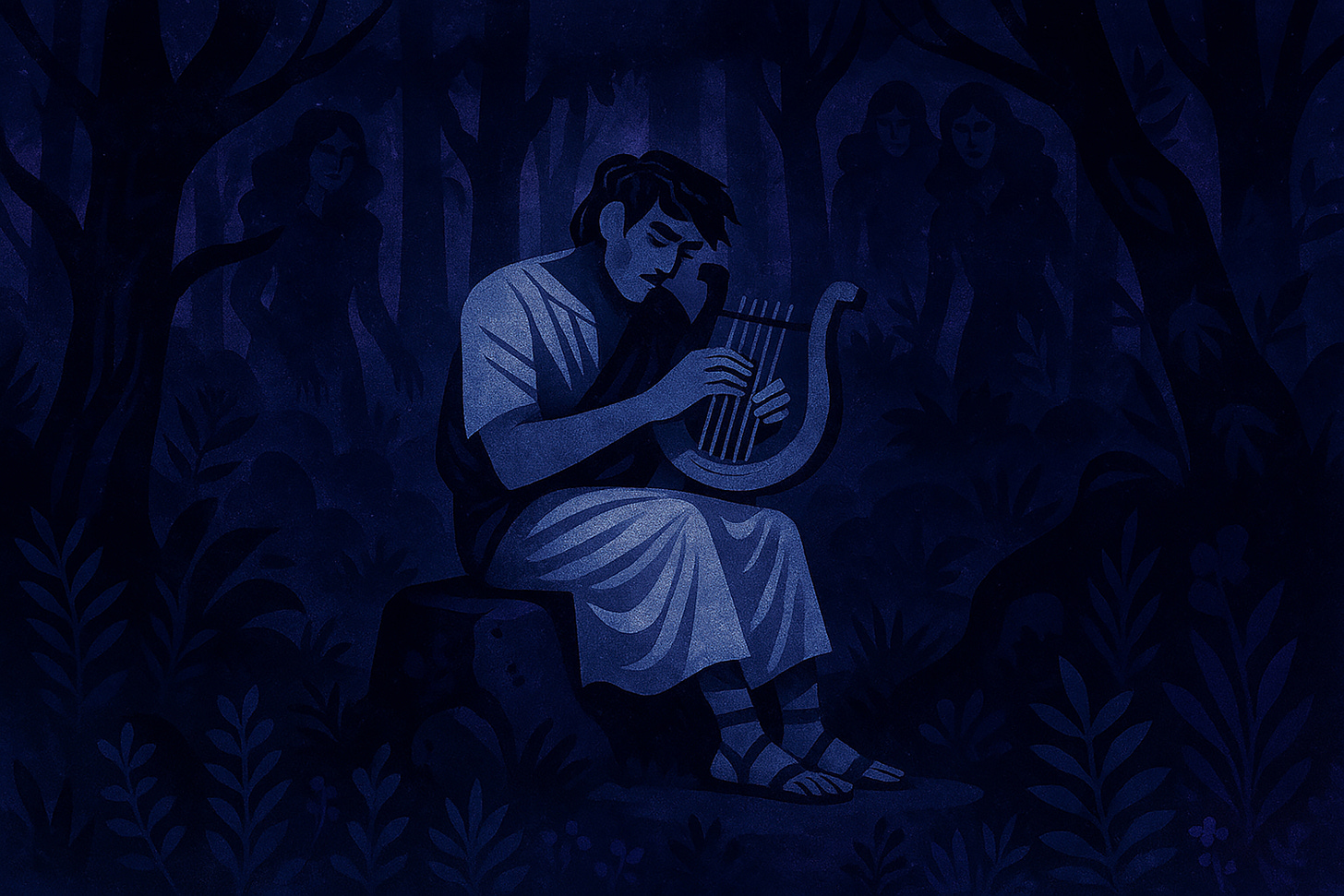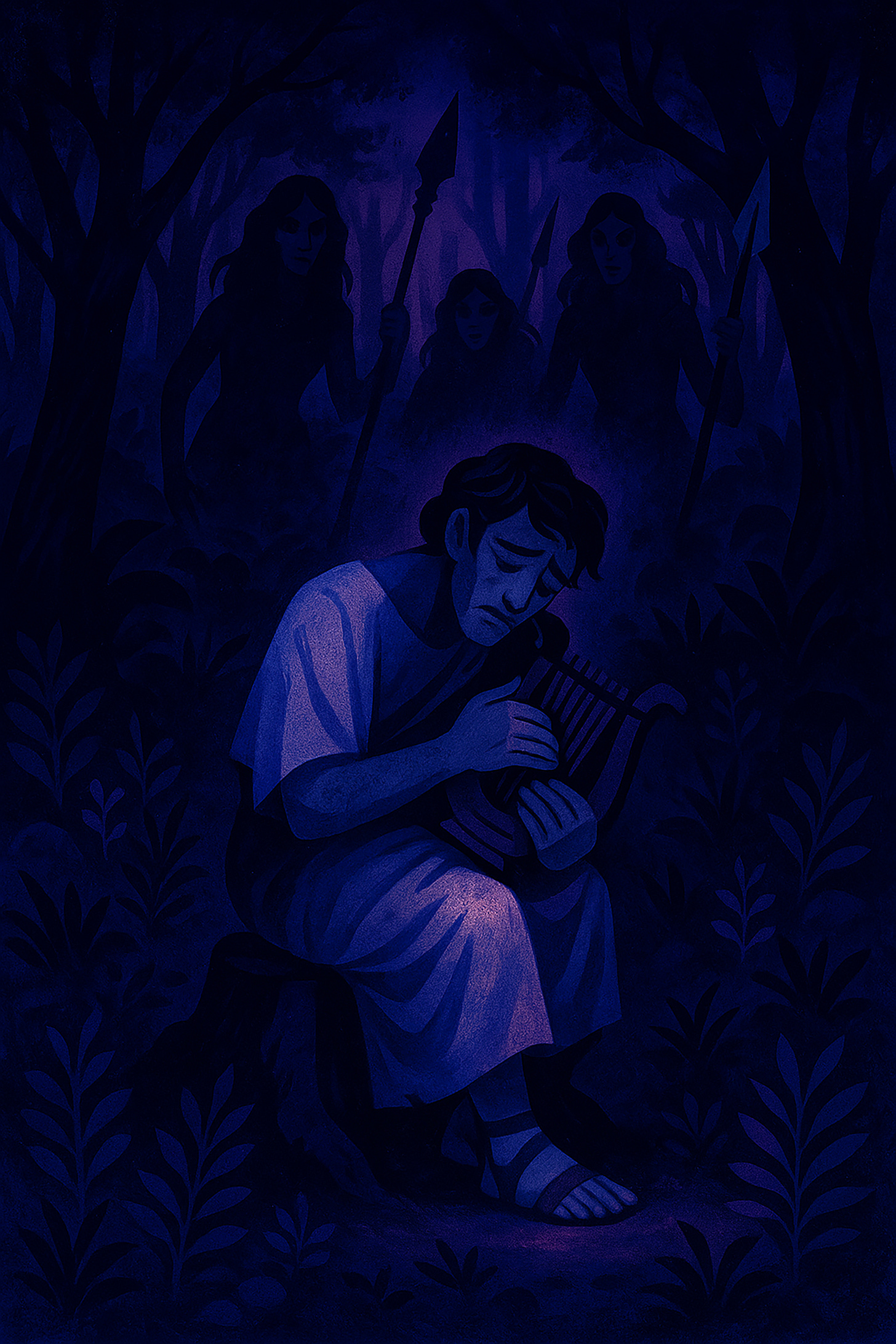The Death of Orpheus
What Devotion Costs a Man in a World That No Longer Knows What to Do with It
Imagine a world without myth—none of the passing down from ancient civilization of the archetype represented by Orpheus.1
The notion that there exists a love that is so powerful, so strong, it would cause a man to go to the end of the world for his beloved.
There would be no true art—no Divine Comedy written by a man whose encounter with his muse was brief at best, with the muse not knowing she would eventually have an impact on Western civilization.2
There would be no On Love written by a man whose brief encounter with his muse led him to write about the crystallization of love and how it occurs through the passing of time.3
But we do have the myth of Orpheus. And we do have the art and the myths created by Dante and Stendhal, and countless other devoted romantics who, over the ages, created the innumerable masterpieces tied to romanticizing a man devoting himself for love to the point of sacrifice.
Because of the myth of Orpheus, it has been instilled in every man, from when he was a child, that he must have something in him to be like Orpheus.
He must be ready to sacrifice himself for love, even if he must project so much of his hopes and desires upon a woman who would not be seen as someone like him—of flesh and blood, human, prone to mistakes—but as his vessel for so much of his inspirational love, to the point of death.
The modern man would make the modern woman his Eurydice because of what had been instilled in him, and he would do so without the woman—whom he’s made the vessel of his inspiration and love—even knowing she has had that great of an impact.
It is that modern man who, when he finds out his Eurydice is no Eurydice but just flesh and blood like him—what does he do but blame her? Can’t you see how much I’ve sacrificed for you, he would say. But whose fault would that be?
Sunrise, sunset.
It is what it is.
The myth that was borne out of the needs of ancient civilizations in formulating an explanation—a reason it could give men—was needed to compel them to die in battle so that the women and children they would have, far from the battle lines, could be as safe as one could be in those times. To die in battle was the ultimate expression of men being like Orpheus.4
So men needed to be that kind of man—honorable—with honor being conflated, at some point, with good. So that instead of being known as honorable, the man who sees himself as an Orpheus now sees it as being good. And what do good men do?
They must be at the ready to die.
Because—sunrise, sunset—that’s just the way it is.
Until it doesn’t have to be.
The notion of chivalry needing to exist at all is an affront to the modern women who have fought to be seen as more than a vessel for a modern man’s hopes and dreams—that she is more than a muse.
And the modern men who have been paying attention, and who no longer want to be ruled over by tradition—which would have these myths as its foundation—find themselves free, just as modern women are finding themselves free as well from being the screen of an artist’s projection that would place them upon a pedestal.
What does that mean for future civilizations that would find themselves ruled by an algorithm that would decide what is worthy of inspiration, and therefore worthy of your attention—when “art” becomes content, stripped down and bland, because something essential will have been lost by then?5
Maybe there had been a period in ancient history, lost in time, that found itself in the same place modern society finds itself in now—and that, through a great collapse of the values that had held it together, discovered in the rebuilding that it was this artist energy that allowed it to evolve again.
Maybe, maybe not.
One thing the algorithm has shown modern men—through the great pooling of data from the decades social media has been in existence—is that sacrifice is no longer worth it;6 he shouldn’t die for her, but live for himself. And living means taking care of oneself—being in the best physical and mental shape—and not letting it rot out from gaming and social media.
It is what it is, now.
All I know is that there was a time when I, and other men, would have seen devotion to the point of sacrifice on that level as grand and noble, honoring the artist’s spirit—the artist’s way—in us.
But we must live for now.
We must live for us and us alone.
And that means giving up all the ghosts.
Something Orpheus should’ve done.
Instead, like the man who, when the time comes at twilight, is led out for execution because of his devotion to an idea, Orpheus was hacked to death by the Maenads, who lurked after him from the dark woods.7
Where the Myth Ends, the Novel Begins
My novel, The Desert Road of Night, follows that man. Devoted to a woman and an idea, he walks into the twilight and declares his amor fati. It’s available now on Amazon, Barnes & Noble, Smashwords, and most major retailers.
Robert Graves, The Greek Myths, rev. ed. (London: Penguin, 1992), 1:113–117.
Dante Alighieri, The Divine Comedy: Inferno, Purgatorio, Paradiso, trans. Allen Mandelbaum (New York: Everyman’s Library, 1995). Dante refers to Beatrice, who he only met briefly, as his spiritual guide and ultimate muse.
Stendhal (Marie-Henri Beyle), On Love, trans. Gilbert and Suzanne Sale (New York: Penguin, 1975). Stendhal’s theory of “crystallization” comes from a fleeting encounter with a woman in Salzburg in 1818.
James Redfield, Nature and Culture in the Iliad: The Tragedy of Hector (Durham: Duke University Press, 1994), 112–115. Classical warfare and its cultural encoding of male sacrifice are explored in detail.
Shoshana Zuboff, The Age of Surveillance Capitalism (New York: PublicAffairs, 2019), 191–223. The algorithm's role in shaping attention and emotional input in the digital age.
Jean M. Twenge, iGen: Why Today’s Super-Connected Kids Are Growing Up Less Rebellious, More Tolerant, Less Happy—and Completely Unprepared for Adulthood (New York: Atria, 2017), 96–112. Data from studies on shifting relationship norms and male behavior in digital environments.
Ovid, Metamorphoses, trans. David Raeburn (London: Penguin Classics, 2004), Book 11. Also see Apollodorus, The Library of Greek Mythology, trans. Robin Hard (Oxford: Oxford University Press, 1997), 1.3.2, for the Maenads’ dismemberment of Orpheus.





